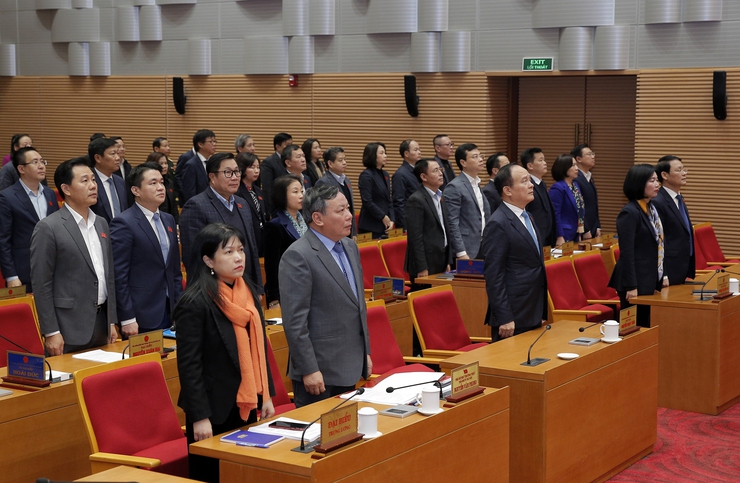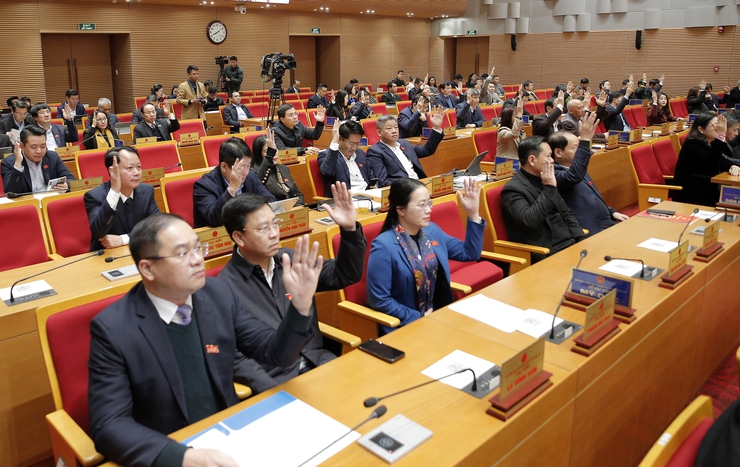In his opening remarks, Chairman of the People's Council Nguyen Ngoc Tuan stated that, based on legal provisions and the city's actual requirements, and following consensus with the People's Committee and the Vietnam Fatherland Front Committee of Hanoi, the Standing Committee of the People's Council decided to convene this session to promptly address several major, urgent issues for the city.

Overview of the session.
First, the People's Council will review and decide on matters related to the restructuring and reorganization of the political system in line with directives from the central government and the Hanoi Party Committee. In recent times, under the resolutions, conclusions, and plans of the Party Central Committee, the Politburo, the Central Steering Committee, the Hanoi Party Committee, and the Standing Committee of the Hanoi Party Committee, efforts have been focused on summarizing the implementation of Resolution No. 18, dated October 25, 2017, by the 12th Party Central Committee.
This resolution concerns "several issues in continuing to reform and streamline the political system for enhanced efficiency and effectiveness." The city has proposed its own restructuring and consolidation plan.
At this session, the People's Council will consider and decide on the establishment and reorganization of specialized agencies and administrative units in Hanoi. It will also determine staffing adjustments, workforce targets for government agencies, and budget allocations for 2025 in line with these restructuring efforts. Chairman Nguyen Ngoc Tuan said that this is a crucial issue to promptly implement central and municipal directives on streamlining the administrative apparatus and enhancing its effectiveness in response to new demands and challenges.
Second, the People's Council will deliberate and approve an adjustment to the city's 2025 socio-economic growth target, setting a growth rate of at least 8 percent, in accordance with Conclusion No. 123 dated January 14, 2025, by the Party Central Committee and Resolution No. 25 dated February 5, 2025, by the government. The year 2025 holds significant importance as a pivotal period for accelerating and achieving key milestones. It marks the final year of the 2021-2025 five-year socio-economic development plan and sets the foundation for Hanoi and the country to confidently enter a new era of growth.

Delegates during the session.
The adjustment of the 2025 economic growth target to at least 8 percent is intended to ensure the overall success of the national growth target and establish a solid base for achieving double-digit growth rates during the 2026-2030 period.
Third, the People's Council will consider investment policies for four critical public investment projects: the approval of investment policies for Tu Lien Bridge and Tran Hung Dao Bridge, the submission of a report to the Prime Minister requesting Hanoi to implement the Ngoc Hoi Bridge project, and an adjustment to the investment policy for the Yen Xa wastewater treatment system. These projects are essential for the city's transportation and environmental infrastructure and present significant challenges in the city's development process. They have received strong attention and directives from national leaders and are highly anticipated by voters and residents. The city is currently focused on leading and directing these projects decisively.
Fourth, the People's Council will review thematic resolutions and policy mechanisms to ensure smooth governance, economic development, and social welfare in the city. These include regulations defining criteria for selecting investors for projects through bidding, the addition of land recovery projects to the 2025 list under the 2024 Land Law, and budget allocations for implementing bonus policies under Government Decree No. 73. The latter applies to public educational institutions that are self-sufficient in regular expenses and are piloting state-funded educational service contracts in Hanoi.
These discussions and decisions aim to ensure that the city maintains its momentum in administrative reform, economic growth, and social development while addressing pressing challenges in governance and public investment.